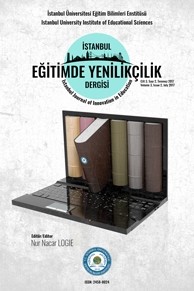EĞİTİM, KÜLTÜR, ÖĞRETMEN; ÖĞRETMEN ODAKLI MI? ÖĞRENCİ ODAKLI MI?
Bu araştırmanın temel amacı, devlet okullarında görev yapan yabancı dil öğretmenlerinin, kendi görüşlerine dayanarak eğitimin odağındaki öğretmenin; öğretim görevlisi, çevre, okul, aile ve öğrenen (öğrenci) ile ilişkilerinin nasıl olması gerektiğine dair tespitleri saptamak ve toplumun tümünü etkileyen öğretmenin niteliğine ve önemine vurgu yapmaktır. Çalışmada nitel araştırma yöntemi kullanılmıştır. Yabancı dil öğretmenlerinin görüşleri, görüşme tekniğiyle elde edilmiş ve NVIVO nitel veri analizi programı ile çözümlenmiştir. Çalışma grubunu Türkiye’nin Yedi farklı bölgesinde okullarında görev yapan 30 yabancı dil öğretmeni oluşturmaktadır. Araştırmadan elde edilen sonuçlara göre, yabancı dil öğretiminde istenen başarıyı elde edememenin nedenleri arasında, izlenceyi uygulamaya koyacak öğretim elemanlarının izlenceyi uygulayacak bilgilerle donatılmamaları, öğretmen adayının yeterli derecede dilsel ve kültürel etkileşimde bulunamadan ham bilgi sahibi olarak mesleğe atılması, öğrenenin hazır bulunuşluk düzeyinin ve her bir öğrenenin farklı bir öğrenme biçimi olduğunun göz ardı edilmesi, teknik araç gereçlerin yetersizliği ve geleneksel yöntemden bir türlü çıkılamaması gibi etkenler sayılmaktadır.
Anahtar Kelimeler:
Yabancı dil, eğitim, politika, öğretmen, öğrenen
EDUCATION, CULTURE, TEACHER; TEACHER CENTERED OR STUDENT CENTERED APPROACH?
The main purpose of this research is to emphasize the importance of foreign language teacher’s features which effect the whole society and to determine how the foreign language teachers, scholars work in public schools need to be the relations between students, the environment, the school, families according to teachers whom in the centre point of education that based on their own opinions. In this research study was used the qualitative research method. The opinions of foreign language teachers were obtained by interview technique and analyzed by NVIVO qualitative data analysis program. The working group constitutes 30 foreign language teachers working in public schools in seven different regions of Turkey. According to the results obtained from the research, the reasons for not achieving the desired target in the foreign language teaching are the fact that the instructors who will put the program into practice are not equipped with the information to apply the curriculum, the teacher candidate is occupied it’s profession as raw information without being able to linguistically and culturally interact and that to be ignored each learner is a different form of learning, inadequacy of technical equipment and inability to get out of the traditional way in some way.
Keywords:
Foreign language, education, policy, teacher, learner,
___
- Bakır, K. (2008). 2. Meşrutiyet Döneminde Milli Seçkinlik ve Eğitim: Emrullah Efendi Tuba Ağacı Nazariyesi, Doğu Batı, C. 1, Mayıs-HaziranTemmuz
- Duffy, Thomas. M. & Cunningham, Daniel. J. (1996). Constructivism: Implications for the design and delivery of instruction. In Jonassen, D. H. (Ed.) Handbook of Research for Educational Communications and Technology. New Jersey: Lawrence Erlbaum Associates.
- Erbakırcı, A. Müge. (2005). Görüşme Tekniği, Yüksek lisans tezi, Ankara Üniversitesi, Ankara.
- Kalkan, Ekrem. (2017). Avrupa Dilleri Ortak Çerçeve Programı Kapsamında Türkiye’de Yabancı Dil Öğretmeni Yetiştirme Politikaları. Yüksek lisans tezi, İstanbul Üniversitesi, İstanbul.
- Şahin, M. ve Tokdemir, M. A. (2011). “II. Meşrutiyet Döneminde Eğitimde Yaşanan Gelişmeler”, Türk Eğitim Bilimleri Dergisi, 9/4, 851-876.
- Yıldırım, A. Şimşek, H. (2011). Sosyal bilimlerde nitel araştırma yöntemleri. Ankara: Seçkin Yayınları.
- ISSN: 2458-8024
- Başlangıç: 2015
- Yayıncı: İstanbul Üniversitesi
Sayıdaki Diğer Makaleler
EĞİTİM, KÜLTÜR, ÖĞRETMEN; ÖĞRETMEN ODAKLI MI? ÖĞRENCİ ODAKLI MI?
DİL EĞİTİMİNDE YAZILI SÖZLÜKLERDEN SESLİ VE GÖRSEL SÖZLÜKLERE GEÇİŞ SORUNSALI
Murat DEMİRKAN, Fatih KARACA, Mustafa BÜKER, Naci Serhat BAŞKAN
MATEMATİK ÖĞRETMEN ADAYLARININ EN ÇOK KULLANDIĞI ÖĞRENME STRATEJİSİ: AKRAN İŞBİRLİĞİ
Hatice Nur ERBAY, Çiğdem ARSLAN, Güneş YAVUZ
TÜRKİYE’DE YABANCI DİL OLARAK FRANSIZCA EĞİTİMİNDE EYLEM ODAKLI YAKLAŞIM
